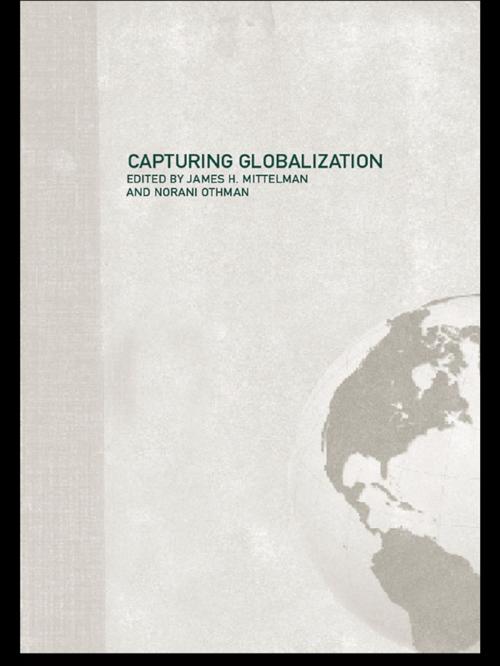Capturing Globalization
Nonfiction, Social & Cultural Studies, Political Science, Politics, Economic Policy, International, International Relations| Author: | ISBN: | 9781134517473 | |
| Publisher: | Taylor and Francis | Publication: | September 2, 2003 |
| Imprint: | Routledge | Language: | English |
| Author: | |
| ISBN: | 9781134517473 |
| Publisher: | Taylor and Francis |
| Publication: | September 2, 2003 |
| Imprint: | Routledge |
| Language: | English |
What are the moral codes and normative principles inscribed in globalization? How do diverse communities optimize their positions, and try to capture these processes? What are the foremost cultural and political attempts to govern the market? What are the social and ethical limits to a framework based on deregulation, privitization and liberalization? These related themes reveal how issues such as religion, private capital flows, poverty, the state and democracy, transnational class structures, disruptions in culture and new patterns in the use of language are part of the globalization process.
Empirically, the research derives from data from fieldwork within and outside Southeast Asia, with a common reference point based on research in Malaysia. Following the trauma of the late 1990s - with environmental abuses in Southeast Asia, transnational turmoil in currency trading and the meltdown of stock markets - this book seeks to understand how, and to what extent, communities can reclaim political and social control over the dynamics of globalization. This highly original contribution to the globalization debate will be invaluable to researchers in a number of disciplines including political science, anthropology, history, economics, Asian Studies and sociology.
What are the moral codes and normative principles inscribed in globalization? How do diverse communities optimize their positions, and try to capture these processes? What are the foremost cultural and political attempts to govern the market? What are the social and ethical limits to a framework based on deregulation, privitization and liberalization? These related themes reveal how issues such as religion, private capital flows, poverty, the state and democracy, transnational class structures, disruptions in culture and new patterns in the use of language are part of the globalization process.
Empirically, the research derives from data from fieldwork within and outside Southeast Asia, with a common reference point based on research in Malaysia. Following the trauma of the late 1990s - with environmental abuses in Southeast Asia, transnational turmoil in currency trading and the meltdown of stock markets - this book seeks to understand how, and to what extent, communities can reclaim political and social control over the dynamics of globalization. This highly original contribution to the globalization debate will be invaluable to researchers in a number of disciplines including political science, anthropology, history, economics, Asian Studies and sociology.















